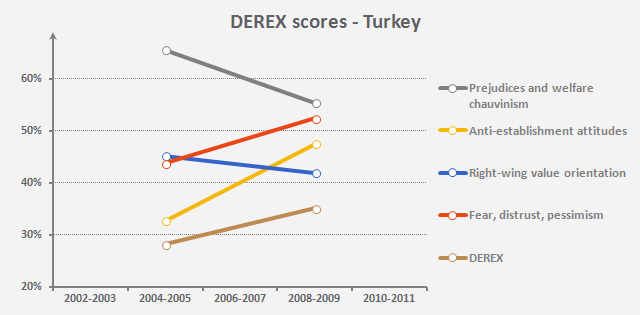Turkey
Factsheet
| ETHNIC MINORITIES: | |
|
Kurdish: Roma: |
20% 3.83% |
| RELIGIONS: | |
|
Muslims (mostly Sunni): Other: |
99.8% 0.2% |
| NET MIGRATION: | -50,000 |
| POP. GROWTH RATE: | 1.3% |
| GDP GROWTH: | 2.2% |
| GDP PER CAPITA: | 10,666 |
| UNEMPLOYMENT: | 8.1% |


Nationalist Movement Party (Milliyetçi Hareket Partisi, MHP)

The party's origins can be traced back to 1965 when Alparslan Türkeş took over the leadership of the Republican Villagers National Party (Cumhuriyetçi Köylü Millet Partisi, CKMP). In the 1970s the organization was associated with the murder of a number of leftist intellectuals and academics. In 1980, following the military coup led by Kenan Evran, the party was banned, similar to other political organizations. The movement was reorganized in 1983 under the aegis is of the Conservative Party and resumed its original name in 1992. Since 1999 the party has been led by Devlet Bahçeli. The MHP's philosophy is characterized by an attempt to resolve the classic Ottoman/Kemalist dichotomy, and with that program it provides an alternative on the Turkish political scene. The leftist spectrum of anti-establishment parties adheres to Kemali foundations, is essentially secular and places the state before religion. At the same time, the followers of Ottoman traditions rally around classic Islamist parties, combining a nationalist imperial ideology with Islamic fundamentalism. In contrast, the MHP places religion behind politics, even as it considers it an important issue of conscience and a medium for the transmission of Ottoman traditions. The party's program calls for the restoration of Turkey’s national, economic power and its former prominence. According to the teachings of the movement, Turkey may only achieve this on its own. Consequently, the party takes a skeptical view of Turkey’s accession talks in progress since 1999, despite the fact that at the start of the talks the party was a coalition member for one term. Moreover, in a country inhabited by 23 ethnic groups, the party is a radical proponent of Turkish supremacy and, by logical extension, a denier of the Armenian Holocaust. In a 550-strong Turkish parliament, currently the MHP has 63 delegates after receiving 13% of the votes in the July 2011 elections. In the previous, 2008 election the party failed to receive the requisite 10% of the votes and lost all seats in Parliament.
MHP on the Internet:
Source:
- Political Capital
Our thematic websites
Political Capital's analyses and activities in English.
Research and advocacy programme focused on the role conspiracy theorising plays in shaping populist and radical politics.
Our project New electoral system in Hungary: watchdogging, advocacy and raising awareness focuses on the electoral reform in Hungary.
Our blog on political and societal extremism and conspiracy theories.
DEREX website is supported by











